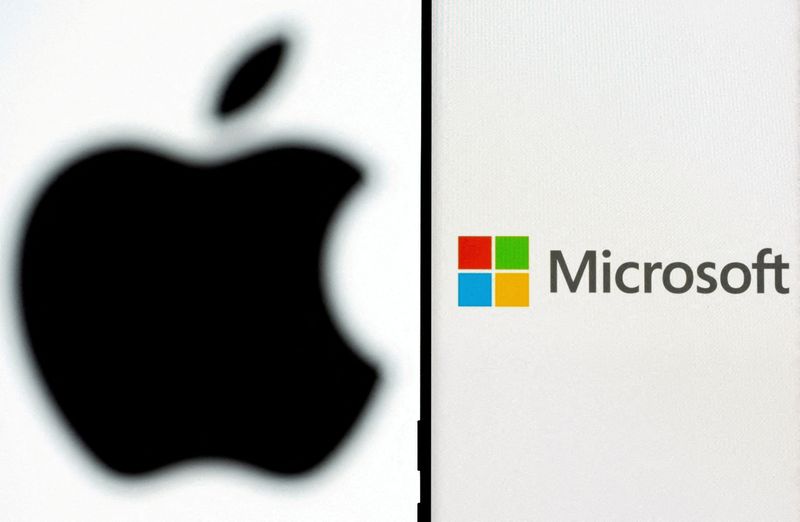By Lewis Krauskopf
NEW YORK (Reuters) -Earnings reports this week from five of the so-called Magnificent Seven stocks are putting a renewed focus on risks from the group’s outsize weighting in the S&P 500, while their collective strength continues pushing U.S. equities to record highs.
Last year, eye-popping gains for the huge tech and growth stocks accounted for the bulk of the S&P 500's 24% rise, with the hefty market values of the seven making them a driving force in the market cap-weighted index. Their performance has already helped drive the S&P 500 up over 3% this year as of Tuesday's close.
But concerns have grown that the companies' huge influence can work both ways, dragging down the broader indexes if they falter.
Analysts at JPMorgan said on Tuesday the market’s narrow leadership was becoming “increasingly unhealthy,” with the Magnificent Seven -- Alphabet (NASDAQ:GOOGL) , Amazon.com (NASDAQ:AMZN) , Apple (NASDAQ:AAPL) , Meta Platforms (NASDAQ:META), Microsoft (NASDAQ:MSFT) , Nvidia (NASDAQ:NVDA) and Tesla (NASDAQ:TSLA) -- accounting for nearly 29% of the S&P 500.
Should the Magnificent Seven stocks weaken, they are “going to have a serious impact on the indices because of the high weight they have,” said Matt Maley, chief market strategist at Miller Tabak. “Any meaningful pullback in tech is going to knock down the major averages and scare a lot of investors.”
The Nasdaq Composite Index is also market cap-weighted, while the 30-component Dow Jones Industrial Average is price-weighted. Of the Magnificent Seven, only Apple and Microsoft are part of the Dow Jones.
The current earnings season is poised to be a test of whether the megacap companies can live up to investors' lofty expectations. The early returns were dour: All of the Magnificent Seven were trading lower on Wednesday morning, weighing on the S&P 500, following results from Microsoft and Alphabet late on Tuesday.
Microsoft, whose market value recently topped $3 trillion, beat estimates for quarterly revenue, but shares were off over 1% as investors absorbed news about rising costs to develop artificial intelligence features. Shares of Google parent Alphabet sank over 6%, as its holiday-season advertising sales disappointed and the company said spending on items such as servers to power AI would jump this year.
Wednesday's share-price drops pared their respective year-to-date gains, with Microsoft last up 7% in 2024 and Alphabet up about 1.5%. Shares of Nvidia are up about 23% this year and Meta Platforms has gained 11%. Tesla shares, on the other hand, are down 23% so far in 2024, tumbling last week after CEO Elon Musk warned sales growth would slow this year.
The Magnificent Seven represent 28.6% of the S&P 500, up from 27.8% at the end of 2023, and close to the highest weight ever for that group of stocks, according to LSEG Datastream data.
In 2023, the Magnificent Seven individually soared between around 50% and 240%, and were collectively responsible for 62% of the S&P 500's total return.
CHALLENGE FOR ACTIVE MANAGERS
While that kind of performance has thrilled many investors, it has presented a more challenging environment for active fund managers, who seek to beat gauges such as the S&P 500 or Russell 1000 because many have held allocations to the Magnificent Seven that are smaller relative to the stocks' weighting in those indexes.
Only 23% of large-cap funds that benchmark against the Russell 1000 beat the index last year, according to JPMorgan data.
Fund managers may hold less of the stocks for a variety of reasons, including a desire for portfolio flexibility, worries over owning too much of any one position and limitations imposed by the rules of their own funds.
"In an environment like this, diversified funds will struggle," said Chuck Carlson, chief executive at Horizon Investment Services. "When you have just a few companies that are leading the way, managers can’t own those companies in enough bulk to offset that concentration of performance at the top."
Indeed, the S&P 500 beat the equal-weight S&P 500, a proxy for the average stock in the index, by 12 percentage points last year. The equal weight index is trailing again so far in 2024, up just 0.4%.
In a note on Tuesday, BofA Global Research said the Magnificent Seven account for almost 20% of the market cap of the MSCI's world equities index, with Apple and Microsoft each nearly the size of Japan, the second-largest country in the index.
The bank’s clients are worried about Magnificent Seven concentration and "that actives will only get more squeezed in to keep up with benchmarks/peers, further fuelling upside momentum," the firm's analysts said.
The stocks could see more volatility later this week, when Apple, Amazon and Meta report quarterly results. To be sure, stellar reports could further invigorate the stocks and drive indexes higher.
“The fact that the market is very concentrated in them does worry me," said Peter Tuz, president of Chase Investment Counsel, which owns the Magnificent Seven stocks except for Tesla. "Mitigating against that is for the most part these are exceptionally strong companies that dominate their niches."
